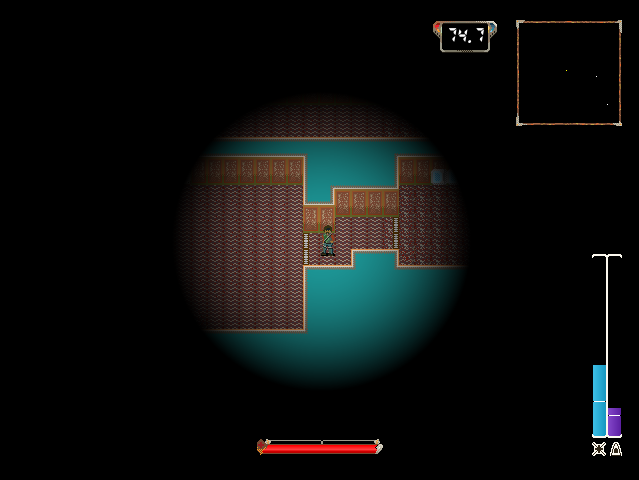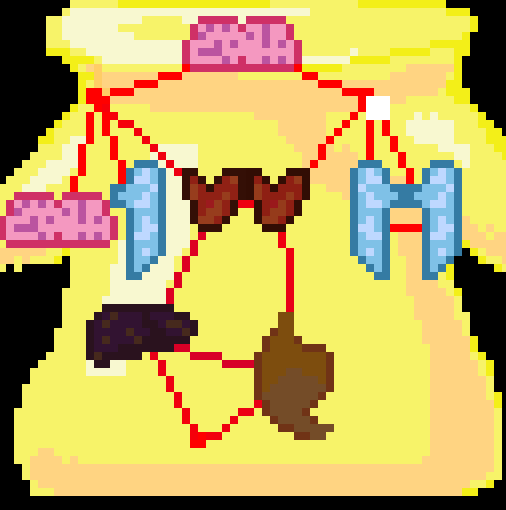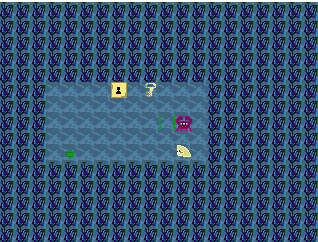 Documentation
¶
Documentation
¶
Overview ¶
Package oak is a game engine. It provides scene control, control over windows and what is drawn to them, propagates regular events to evaluate game logic, and so on. Oak also serves as the top level package and contains all the subdirectories that make up the Oak engine.
Example ¶
Use oak to display a scene with a single movable character
Add("basicScene", func(string, interface{}) {
char := entities.NewMoving(100, 100, 16, 32,
render.NewColorBox(16, 32, color.RGBA{255, 0, 0, 255}),
nil, 0, 0)
render.Draw(char.R)
}, func() bool {
return true
}, func() (string, *scene.Result) {
return "basicScene", nil
})
Init("basicScene")
Output:
Index ¶
- Constants
- Variables
- func Add(name string, start scene.Start, loop scene.Loop, end scene.End) error
- func AddCommand(s string, fn func([]string)) error
- func AddScene(name string, s scene.Scene) error
- func BindKey(key string, binding string)
- func BindKeyBindings(r io.Reader) error
- func BindKeys(bindings KeyBindings)
- func ChangeWindow(width, height int)
- func ClearCommand(s string)
- func ClearScreenFilter()
- func ForceAddCommand(s string, fn func([]string)) func([]string)
- func GetDebugKeys() []string
- func GetKeyBind(key string) string
- func GetScreen() *image.RGBA
- func GetViewportBounds() (x1, y1, x2, y2 int, ok bool)
- func Init(firstScene string)
- func IsDown(key string) (k bool)
- func IsHeld(key string) (k bool, d time.Duration)
- func LoadConf(filePath string) error
- func LoadConfData(r io.Reader) error
- func MoveWindow(x, y, w, h int) error
- func Quit()
- func RecordGIF(hundredths int) (stop func() *gif.GIF)
- func RemoveViewportBounds()
- func ResetCommands()
- func ScreenShot() *image.RGBA
- func SeedRNG(inSeed int64)
- func SetAspectRatio(xToY float64)
- func SetBinaryPayload(payloadFn func(string) ([]byte, error), dirFn func(string) ([]string, error))
- func SetBorderless(on bool) error
- func SetFullScreen(on bool) error
- func SetKeyBindings(r io.Reader) error
- func SetLang(s string)
- func SetLogicHandler(h event.Handler)
- func SetPalette(palette color.Palette)
- func SetScreen(x, y int)
- func SetScreenFilter(screenFilter mod.Filter)
- func SetTopMost(on bool) error
- func SetViewportBounds(x1, y1, x2, y2 int)
- func ShakeScreen(dur time.Duration)
- func UnbindAllKeys()
- func UnbindKey(key string)
- func ViewVector() physics.Vector
- type Assets
- type Borderlesser
- type Config
- type Debug
- type Driver
- type Font
- type FullScreenable
- type InputType
- type KeyBindings
- type Language
- type MovableWindow
- type Screen
- type ScreenShaker
- type TopMoster
Examples ¶
Constants ¶
const ( // DefaultSeed is a key int64 sent in to SeedRNG // used to indicate that the seed function should just // do the default operation for seeding, using the current // time. DefaultSeed int64 = iota )
Variables ¶
var ( // SetupConfig is the config struct read from at initialization time // when oak starts. When oak.Init() is called, the variables behind // SetupConfig are passed to their appropriate places in the engine, and // afterword the variable is unused. SetupConfig Config // SetupFullscreen defines whether the initial screen will start as a fullscreen // window. This variable will go away when oak reaches 3.0, and it will be folded // into the config struct. SetupFullscreen bool // SetupBorderless defines whether the initial screen will start as a borderless // window. This variable will go away when oak reaches 3.0, and it will be folded // into the config struct. SetupBorderless bool // SetupTopMost defines whether the initial screen will start on top of other // windows (even when out of focus). This variable will go away when oak reaches // 3.0, and it will be folded into the config struct. SetupTopMost bool )
var ( // Background is the uniform color drawn to the screen in between draw frames Background = image.Black // DrawTicker is the parallel to LogicTicker to set the draw framerate DrawTicker *timing.DynamicTicker )
var ( // ScreenWidth is the width of the screen ScreenWidth int // ScreenHeight is the height of the screen ScreenHeight int // FrameRate is the current logical frame rate. // Changing this won't directly effect frame rate, that // requires changing the LogicTicker, but it will take // effect next scene FrameRate int // DrawFrameRate is the equivalent to FrameRate for // the rate at which the screen is drawn. DrawFrameRate int )
var ( // ColorPalette is the current color palette oak is set to conform to. Modification of this // value directly will not effect oak's palette, use SetPalette instead. If SetPallete is never called, // this is the zero value ([]Color of length 0). ColorPalette color.Palette )
var ( // DefShaker is the global default shaker, used when oak.ShakeScreen is called. DefShaker = ScreenShaker{false, floatgeom.Point2{1.0, 1.0}} )
var (
DefaultDriver = driver.Main
)
Driver alternatives
var InitDriver = DefaultDriver
InitDriver is the driver oak will call during initialization
var ( // LoadingR is a renderable that is displayed during loading screens. LoadingR render.Renderable )
var ( // SceneMap is a global map of scenes referred to when scenes advance to // determine what the next scene should be. // It can be replaced or modified so long as these modifications happen // during a scene or before oak has started. SceneMap = scene.NewMap() )
var ( // UseAspectRatio determines whether new window changes will distort or // maintain the relative width to height ratio of the screen buffer. UseAspectRatio = false )
var ( // ViewPos represents the point in the world which the viewport is anchored at. ViewPos = image.Point{} )
Functions ¶
func Add ¶
Add is shorthand for oak.SceneMap.Add /scene#Add
Example ¶
Add("basicScene", func(string, interface{}) { // Whatever you want to do while in the scene
}, func() bool { // return whether this scene should loop or exit on end
return true
}, func() (string, *scene.Result) { // What scene to progress to, make sure its set up!
return "sceneToBeImplemented", nil
})
Output:
func AddCommand ¶
AddCommand adds a console command to call fn when '<s> <args>' is input to the console. fn will be called with args split on whitespace.
Example ¶
Use AddCommand to grant access to command line commands. Often used to toggle debug modes.
debug := true
AddCommand("SetDebug", func(args []string) {
if len(args) == 0 {
debug = !debug
}
switch args[0][:1] {
case "t", "T":
debug = true
case "f", "F":
debug = false
}
})
Output:
func AddScene ¶
AddScene is shorthand for oak.SceneMap.AddScene
Example ¶
Addscene lets a central package manage a set of scenes across subpackages such as in weekly87 Note the example wont work because there is nothing
AddScene("scene1", getBasicScene())
AddScene("scene2", getBasicScene())
Output:
func BindKeyBindings ¶
BindKeyBindings loads and binds KeyBindings at once. It maintains existing keybindings not a part of the input reader.
func BindKeys ¶
func BindKeys(bindings KeyBindings)
BindKeys loops over and binds all pairs in the input KeyBindings
func ChangeWindow ¶
func ChangeWindow(width, height int)
ChangeWindow sets the width and height of the game window. Although exported, calling it without a size event will probably not act as expected.
func ClearCommand ¶
func ClearCommand(s string)
ClearCommand clears an existing debug command by key: <s>
func ClearScreenFilter ¶
func ClearScreenFilter()
ClearScreenFilter resets the draw function to no longer filter the screen before publishing it to the window.
func ForceAddCommand ¶
ForceAddCommand adds or overwrites a console command to call fn when '<s> <args>' is input to the console. fn will be called with args split on whitespace. If a command is overwritten the overwritten command will be returned.
func GetDebugKeys ¶
func GetDebugKeys() []string
GetDebugKeys returns the current debug console commands as a string array
func GetKeyBind ¶
GetKeyBind returns either whatever name has been bound to a key or the key if nothing has been bound to it. Todo: this should be a var function that starts out as "return key", and only becomes this function when a binding is made.
func GetViewportBounds ¶
GetViewportBounds reports what bounds the viewport has been set to, if any.
func Init ¶
func Init(firstScene string)
Init initializes the oak engine. It spawns off an event loop of several goroutines and loops through scenes after initialization.
func LoadConf ¶
LoadConf loads a config file, that could exist inside oak's binary data storage (see fileutil), to SetupConfig
func LoadConfData ¶
LoadConfData takes in an io.Reader and decodes it to SetupConfig
func MoveWindow ¶
MoveWindow sets the position of a window to be x,y and it's dimensions to w,h If the window does not support being positioned, it will report as such.
func RecordGIF ¶
RecordGIF will start recording frames via screen shots with the given time delay (in 1/100ths of a second) between frames. When the returned stop function is called, the frames will be compiled into a gif.
func RemoveViewportBounds ¶
func RemoveViewportBounds()
RemoveViewportBounds removes restrictions on the viewport's movement. It will not cause ViewPos to update immediately.
func ResetCommands ¶
func ResetCommands()
ResetCommands will throw out all existing debug commands from the debug console.
func ScreenShot ¶
ScreenShot takes a snap shot of the window's image content. ScreenShot is not safe to call while an existing ScreenShot call has yet to finish executing. This could change in the future.
func SeedRNG ¶
func SeedRNG(inSeed int64)
SeedRNG seeds go's random number generator and logs the seed set to file.
func SetAspectRatio ¶
func SetAspectRatio(xToY float64)
SetAspectRatio will enforce that the displayed window does not distort the input screen away from the given x:y ratio. The screen will not use these settings until a new size event is received from the OS.
func SetBinaryPayload ¶
SetBinaryPayload just sets some public fields on packages that require access to binary functions as alternatives to os file functions. This is no longer necessary, as a single package uses these now.
func SetBorderless ¶
SetBorderless attempts to set the local oak window to have no border. If the window does not support this functionaltiy, it will report as such.
func SetFullScreen ¶
SetFullScreen attempts to set the local oak window to be full screen. If the window does not support this functionality, it will report as such.
func SetKeyBindings ¶
SetKeyBindings removes all existing keybindings and then binds all bindings within the input reader.
func SetLogicHandler ¶
SetLogicHandler swaps the logic system of the engine with some other implementation. If this is never called, it will use event.DefaultBus
func SetPalette ¶
SetPalette tells oak to conform the screen to the input color palette before drawing.
func SetScreen ¶
func SetScreen(x, y int)
SetScreen sends a signal to the draw loop to set the viewport to be at x,y
func SetScreenFilter ¶
SetScreenFilter will filter the screen by the given modification function prior to publishing the screen's rgba to be displayed.
func SetTopMost ¶
SetTopMost attempts to set the local oak window to stay on top of other windows. If the window does not support this functionality, it will report as such.
func SetViewportBounds ¶
func SetViewportBounds(x1, y1, x2, y2 int)
SetViewportBounds sets the minimum and maximum position of the viewport, including screen dimensions
func ShakeScreen ¶
ShakeScreen will Shake using the package global DefShaker
func UnbindAllKeys ¶
func UnbindAllKeys()
UnbindAllKeys clears the contents of the oak's keybindings.
Types ¶
type Assets ¶
type Assets struct {
AssetPath string `json:"assetPath"`
AudioPath string `json:"audioPath"`
ImagePath string `json:"imagePath"`
FontPath string `json:"fontPath"`
}
Assets is a json type storing paths to different asset folders
type Borderlesser ¶
A Borderlesser is a window that can have its border removed or replaced after removal.
type Config ¶
type Config struct {
Assets Assets `json:"assets"`
Debug Debug `json:"debug"`
Screen Screen `json:"screen"`
Font Font `json:"font"`
FrameRate int `json:"frameRate"`
DrawFrameRate int `json:"drawFrameRate"`
Language string `json:"language"`
Title string `json:"title"`
BatchLoad bool `json:"batchLoad"`
GestureSupport bool `json:"gestureSupport"`
LoadBuiltinCommands bool `json:"loadBuiltinCommands"`
TrackInputChanges bool `json:"trackInputChanges"`
}
Config stores initialization settings for oak.
type Driver ¶
A Driver is a function which can take in our lifecycle function and initialize oak with the OS interfaces it needs.
type Font ¶
type Font struct {
Hinting string `json:"hinting"`
Size float64 `json:"size"`
DPI float64 `json:"dpi"`
File string `json:"file"`
Color string `json:"color"`
}
Font is a json type storing the default font settings
type FullScreenable ¶
FullScreenable defines windows that can be set to full screen.
type InputType ¶
type InputType int
InputType expresses some form of input to the engine to represent a player
var ( // MostRecentInput tracks what input type was most recently detected. // This is only updated if TrackInputChanges is true in the config at startup MostRecentInput InputType )
type KeyBindings ¶
KeyBindings map input keys to meaningful names, so code can be built around those meaningufl names and users can easily rebind which keys do what.
func LoadKeyBindings ¶
func LoadKeyBindings(r io.Reader) (KeyBindings, error)
LoadKeyBindings converts a reader into a map of keys to meaningful names. It expects a simple .toml syntax, of key = "value" pairs per line. The resulting KeyBindings will have the keys and values reversed, so `MoveUp = "W"` will correspond to kb["W"] = "MoveUp"
type Language ¶
type Language int
Language is hypothetically something games might care about in their text work: Consider moving this to oakerr, and also moving all strings to oakerr so messages output by the engine are localized.
var ( // Lang is the current langugae Lang Language )
type MovableWindow ¶
MovableWindow defines windows that can have their position set
type Screen ¶
type Screen struct {
X int `json:"X"`
Y int `json:"Y"`
Height int `json:"height"`
Width int `json:"width"`
Scale int `json:"scale"`
}
Screen is a json type storing the starting screen width and height
type ScreenShaker ¶
A ScreenShaker knows how to shake a screen by a (or up to a) given magnitude. If Random is true, the Shaker will shake up to the (negative or positive) magnitude of each the X and Y axes. Otherwise, it will oscillate between negative magnitude and positive magnitude.
func (*ScreenShaker) Shake ¶
func (ss *ScreenShaker) Shake(dur time.Duration)
Shake shakes the screen based on this ScreenShaker's attributes. See DefShaker for an example shaker setup
 Source Files
¶
Source Files
¶
 Directories
¶
Directories
¶
| Path | Synopsis |
|---|---|
|
Package alg stores useful algorithms and math functions
|
Package alg stores useful algorithms and math functions |
|
floatgeom
Package floatgeom stores primitives for floating point geometry
|
Package floatgeom stores primitives for floating point geometry |
|
intgeom
Package intgeom stores primitives for integer geometry
|
Package intgeom stores primitives for integer geometry |
|
Package audio provides audio types, font types for filtering audio reactively, and channels to allow constant audio play signals to be restricted to play at variable frequencies.
|
Package audio provides audio types, font types for filtering audio reactively, and channels to allow constant audio play signals to be restricted to play at variable frequencies. |
|
Package collision provides collision tree and space structures along with hit detection functions on spaces.
|
Package collision provides collision tree and space structures along with hit detection functions on spaces. |
|
ray
Package ray holds utilities for performing iterative collision checks or raycasts
|
Package ray holds utilities for performing iterative collision checks or raycasts |
|
Package dlog provides logging functions with caller file and line information, logging levels and level and text filters.
|
Package dlog provides logging functions with caller file and line information, logging levels and level and text filters. |
|
Package entities stores useful object and entity types, such as positions and renderables, collision spaces and renderables, and delta / speed vectors built into the above types.
|
Package entities stores useful object and entity types, such as positions and renderables, collision spaces and renderables, and delta / speed vectors built into the above types. |
|
Package event propagates events through entities with given caller IDs.
|
Package event propagates events through entities with given caller IDs. |
|
examples
|
|
|
Package fileutil provides functionality to subvert os and ioutil calls when needed for particular operating systems (js) or runtimes (asset data packaged into a binary)
|
Package fileutil provides functionality to subvert os and ioutil calls when needed for particular operating systems (js) or runtimes (asset data packaged into a binary) |
|
Package joystick provides utilities for querying and reacting to joystick or gamepad inputs.
|
Package joystick provides utilities for querying and reacting to joystick or gamepad inputs. |
|
Package key enumerates keystrings for use in bindings
|
Package key enumerates keystrings for use in bindings |
|
Package mouse handles the propagation of mouse events though clickable regions.
|
Package mouse handles the propagation of mouse events though clickable regions. |
|
Package oakerr stores errors returned throughout oak.
|
Package oakerr stores errors returned throughout oak. |
|
Package physics provides vector types and operations to perform math and simple physics on those types.
|
Package physics provides vector types and operations to perform math and simple physics on those types. |
|
Package render provides several types of renderable entities which are used throughout the code base In addition to entities the package also provides utilities to load images from files and load images from parts of files as well as draw them.
|
Package render provides several types of renderable entities which are used throughout the code base In addition to entities the package also provides utilities to load images from files and load images from parts of files as well as draw them. |
|
mod
Package mod stores modification functions for images
|
Package mod stores modification functions for images |
|
particle
Package particle provides options for generating renderable particle sources.
|
Package particle provides options for generating renderable particle sources. |
|
Package scene stores definitions for interacting with game loop scenes
|
Package scene stores definitions for interacting with game loop scenes |
|
Package shape provides types to satisfy the Shape interface, which allows for containment and outline checks on two dimensional shapes.
|
Package shape provides types to satisfy the Shape interface, which allows for containment and outline checks on two dimensional shapes. |
|
Package timing provides utilities for time
|
Package timing provides utilities for time |









